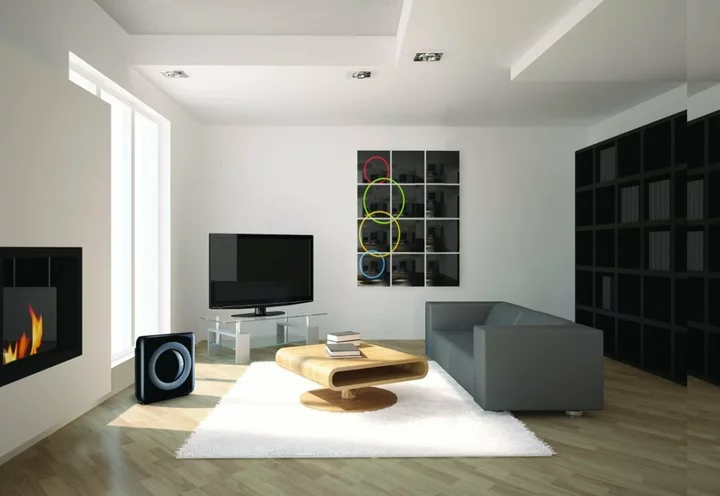We know taking deep breaths is calming and all, and we don't want to freak you out — but those big gulps of untreated air can contain a lot of allergens, not to mention harmful contaminants and irritants.
For one thing, pollen season is getting worse every year. (If your allergies seem more annoying than usual lately, it's not your imagination.) The U.S. Environmental Protection Agency (EPA) notes that warmer temperatures and increased carbon dioxide levels have caused plants to produce more allergenic pollen in larger quantities.
Combined with worsening levels of smog and other fine-particle air pollution amid increased natural gas use, a rise in car usage, and the now-annual wildfires that burn through the West, it's no wonder air purifiers (or air cleaners, as they're sometimes called) have made their way onto lists of must-have home appliances.
What are the benefits of air purifiers?
Air purifiers provide both preventative benefits by helping you avoid long-term exposure to dirty air, and by treating ailments such as asthma and allergies.
“We all know that horrifying feeling when you see the dirty filter of an air purifier to realize what we’ve been breathing into our lungs and bloodstream all these years,” says Dr. Zhang Yan, Founder and CEO of air purification company Airdog. She holds dozens of patents and launched the first ionic air purifiers in the North American market in 2017.
She says that eliminating harmful airborne particles is the best way to cope with allergies and other respiratory issues — and there may be no better way to trap pain-in-the-ass irritants and increase air quality than by using an air purifier.
Do air purifiers help with seasonal allergies?
“Allergies are caused by high levels of allergens in the air that cause reactions in people with particular sensitivities to these particles,” says Zhang. These include things like dust, pollen, spores, hair, dandruff, bacteria, and smoke. “Air purifiers have been proven to remove all of these particles from the air,” she notes.
Dr. Shradha Agarwal, allergist and immunologist at Mount Sinai Hospital in New York says that reducing or eliminating exposures to allergens in your environment is key to reducing allergy symptoms. She says that many people with pet or pollen allergies ask about the effectiveness of an air purifier for allergies in reducing their symptoms, and says that getting the right unit is key.
“An air purifier is a device that is designed to remove or neutralize contaminants that a standard air filter cannot. In some cases air cleaners are helpful, but in others are ineffective. In some cases they can actually irritate a person’s airway if they release ions and produce ozone, and are not recommended for people with lung disease,” she says.
Do air purifiers help with asthma?
The Environmental Protection Agency (EPA) states that high-efficiency particulate air (HEPA) filters can remove up to 99.97% of dust, pollen, and any other airborne particles with a size of 0.3 microns. Agarwal says that the exact magnitude of the effects of an air filter for asthma is not well established, but reviews of several studies have demonstrated a positive benefit (aka reduced symptoms) after prolonged periods of use.
“As an allergist/immunologist, we typically recommend a room air cleaner with a high HEPA filter that can be regularly replaced.” She recommends placing devices three to five feet from the ground in an unobstructed area of the problem room.
What do air purifiers filter out?
Air filters can remove things like dust, pollen, spores, hair, dandruff, bacteria, and smoke particles from the air. Any air purifier worth its salt should remove up to 99.9% of airborne particles with a size of 0.3 microns.
“You will be able to notice the difference in air quality right away,” says Zhang. “The air smells and feels cleaner. If you live in a dusty environment or have pets or have allergies, after using an air purifier you will wonder how you ever survived without one.”
What are the best air purifiers?
When it comes to weeding out the best air purifiers, experts agree on a comparing a few key considerations:
Frequency and cost to replace filters. Agarwal says this should be done every 3 months. Zhang recommends looking for models with washable filters.
MERV rating. The minimum efficiency reporting value (MERV) rating measures the effectiveness of the air filter. Agarwal says that filters with higher MERV ratings capture smaller particulars.
CADR (clean air delivery rate) reflects, in cubic feet per minute, the volume of clean air that an air purifier produces at its highest speed setting. Agarwal says that the higher the CADR, the faster and more efficient the device is, and that room air cleaners with HEPA filters often achieve the highest CADR.
Room size. Ensure the air purifier you’re considering is rated for the size of your space.
Noise level. You want to reap the benefits of your air purifier without losing sleep. Agarwal says that some models have the option of a sleep setting or a quiet fan.
Warranty. Opt for models with at least a one year warranty to help protect your investment.
With the above in mind, we scoured the internet to find the models with the best customer reviews and separated them by price. Whether you need something small and portable or you're in the market for an air purifier that can handle the whole house, we've got you covered.









